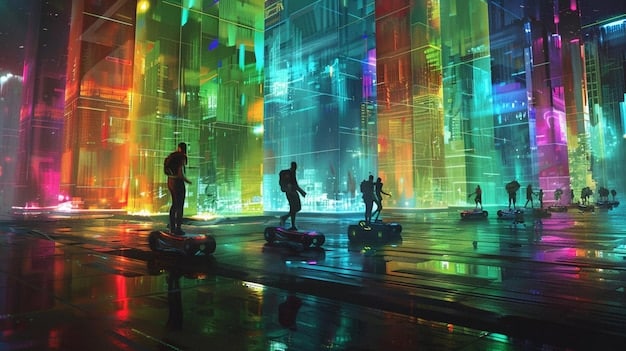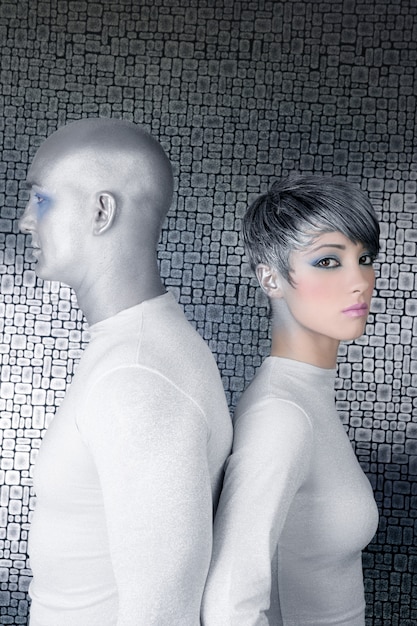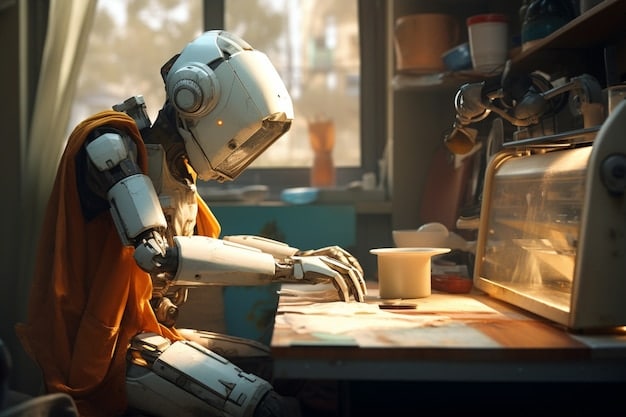AI in US Entertainment: Will Robots Replace Actors & Writers?

The Rise of AI in US Entertainment: Will Robots Replace Actors and Writers? explores the increasing integration of artificial intelligence into the entertainment industry, examining its potential impact on traditional roles such as actors and writers in the US.
The entertainment industry in the United States is facing a significant transformation with the rise of artificial intelligence (AI). Will the rise of AI in US Entertainment: Will Robots Replace Actors and Writers? threaten the roles of actors and writers?
The Expanding Role of AI in Entertainment
Artificial intelligence is rapidly evolving and its adoption across various sectors, including the entertainment industry, is becoming more prevalent. This technological shift is causing both excitement and concern among industry professionals in the US. Understanding the scope of AI’s integration is crucial to assessing its potential impact.
AI in Scriptwriting
AI tools are now capable of generating scripts and story ideas. These tools analyze vast datasets of existing scripts to identify successful patterns and create new content. The question is, can these AI-generated scripts capture the nuance and originality of human-written stories?
AI-Generated Actors
Digital actors created by AI are becoming increasingly sophisticated, blurring the lines between real and virtual performers. These AI actors can be customized to fit specific roles and can perform tasks that are difficult or impossible for human actors, such as stunts or appearing in multiple locations simultaneously.
- AI can create personalized content recommendations for viewers.
- AI-driven animation and visual effects are becoming more realistic and cost-effective.
- AI is being used to enhance audio quality and create immersive soundscapes.

The increasing use of AI in these areas suggests a future where technology plays a more central role in content creation, potentially reshaping traditional roles and workflows. Professionals need to adapt to these changes to remain competitive.
AI’s Potential Impact on Actors
With the rise of AI-generated actors, it’s natural to question the future of human actors in the entertainment industry. While it’s unlikely that AI will completely replace human talent, the potential impact is significant and multifaceted.
Cost Efficiency
AI actors can offer substantial cost savings for production companies. They don’t require salaries, benefits, or residuals, and they can work around the clock without fatigue. This economic advantage could lead to increased adoption of AI actors in certain types of productions.
Creative Control
AI actors offer filmmakers greater control over performances. They can be easily manipulated and adjusted to meet the director’s exact vision, eliminating the need for reshoots or compromises due to actors’ limitations. This level of control can be appealing to directors seeking perfection.
- AI actors expand creative possibilities by enabling scenes and performances that would be impossible with human actors.
- AI can analyze audience reactions to optimize actors’ performances, ensuring maximum engagement.
- Human actors bring emotional depth and authenticity that AI may struggle to replicate.
The acting profession may shift, with actors focusing on roles that require unique human qualities, while AI actors handle more generic or technical roles. Staying ahead of these trends will be critical for actors.
AI’s Potential Impact on Writers
Just as AI is changing the landscape for actors, it also poses both opportunities and challenges for writers. AI tools are now capable of assisting with various aspects of the writing process, from generating ideas to editing scripts.
Idea Generation
AI algorithms can analyze vast amounts of data to identify popular themes, trends, and story structures. This can help writers overcome writer’s block and brainstorm new ideas. However, the reliance on AI-generated ideas could lead to a homogenization of content.
Efficiency and Productivity
AI writing tools can automate tasks such as outlining, character development, and dialogue writing, freeing up writers to focus on more creative aspects of the writing process. This increased efficiency could lead to more content being produced in less time.

AI may change the way writers work, with AI tools becoming an integral part of the writing process. Writers and AI can collaborate to produce innovative and engaging content, but AI could reduce the demand for human writers.
The Legal and Ethical Considerations
The rise of AI in the entertainment industry raises complex legal and ethical questions that need to be addressed. These issues involve copyright, ownership, and the rights of human creators.
Copyright Issues
Determining who owns the copyright to AI-generated content is a major challenge. If an AI creates a script or a song, is the copyright held by the AI’s creator, the user who prompted the AI, or does it fall into the public domain? Legal frameworks need to adapt to these new realities.
Ethical Concerns
The use of AI in entertainment raises ethical concerns about job displacement, the authenticity of creative work, and the potential for bias in AI algorithms. The industry needs to develop ethical guidelines to ensure AI is used responsibly and fairly.
The entertainment industry must balance the benefits of AI with the need to protect the rights and livelihoods of human creators. Clear guidelines and regulations are essential to navigate these challenges.
Adapting to the Future: Skills and Strategies
To thrive in an AI-driven entertainment industry, actors and writers need to develop new skills and strategies. Embracing technology and adapting to the changing landscape is essential for career success.
Embrace Technology
Actors and writers should familiarize themselves with AI tools and explore how they can be used to enhance their work. This includes learning how to use AI writing software, understanding AI-driven animation techniques, and experimenting with virtual performance technologies.
Develop Unique Skills
Focus on developing skills that AI cannot easily replicate, such as emotional intelligence, creativity, and complex storytelling. These uniquely human qualities will become even more valuable in an AI-driven world.
The entertainment industry will continue to need creative and adaptable professionals who can leverage technology to create engaging content. By embracing change and developing new skills, actors and writers can thrive in this evolving landscape.
Predictions for the Future of AI in Entertainment
Looking ahead, AI is poised to play an even bigger role in the US entertainment industry. Several trends and predictions offer a glimpse into what the future might hold, from personalized entertainment experiences to the rise of virtual celebrities.
Personalized Entertainment
AI algorithms will become increasingly sophisticated at analyzing viewer preferences and creating personalized entertainment experiences. This could lead to customized movies, TV shows, and games that cater to individual tastes.
Virtual Celebrities
AI-generated virtual celebrities could become mainstream, with AI actors and influencers gaining large followings. These virtual personalities can be tailored to appeal to specific demographics and can be controlled by production companies.
- AI will drive innovation across all aspects of entertainment, from production to distribution.
- Human-AI collaboration will lead to the creation of entirely new forms of entertainment.
- The entertainment industry will become more data-driven, with AI algorithms guiding creative decisions.
While these predictions may seem futuristic, many of the underlying technologies are already in development. The entertainment industry will continue to evolve, driven by the relentless pace of technological innovation.
| Key Point | Brief Description |
|---|---|
| 🤖 AI Actors | AI-generated actors offer cost-efficiency and creative control. |
| ✍️ AI Writers | AI tools assist with idea generation and scriptwriting, increasing efficiency. |
| ⚖️ Legal & Ethical | Copyright, ownership, and ethical concerns arise with AI-generated content. |
| 🎬 Future Trends | Personalized entertainment and virtual celebrities are emerging trends. |
FAQ
▼
It’s unlikely AI will entirely replace human actors. Human actors bring unique emotional depth and authenticity that AI may struggle to replicate. AI will likely supplement human actors in certain roles.
▼
AI is used in scriptwriting for idea generation, outlining, and even generating dialogue. It can analyze vast datasets of scripts to identify trends and patterns, assisting writers in creating engaging content.
▼
Ethical concerns include job displacement, authenticity of creative work, and potential biases in AI algorithms. Ensuring responsible and fair use of AI in entertainment is crucial to safeguard human creators.
▼
Actors and writers should embrace technology, develop unique skills like emotional intelligence, and focus on creativity. This adaptability will ensure they remain competitive and relevant in an AI-driven industry.
▼
Future predictions include personalized entertainment experiences, the rise of virtual celebrities, and AI driving innovation across all aspects of entertainment, from production to distribution, enhancing viewer engagement.
Conclusion
The integration of AI into the US entertainment industry is transforming traditional roles and creating new opportunities. While the rise of AI poses challenges to actors and writers, adapting to change and embracing technology are key to thriving in this evolving landscape.